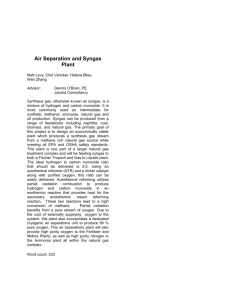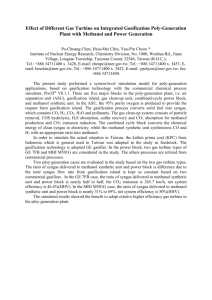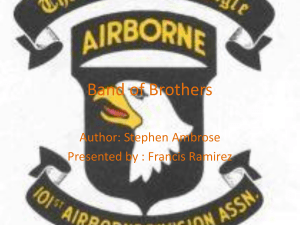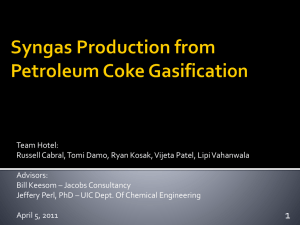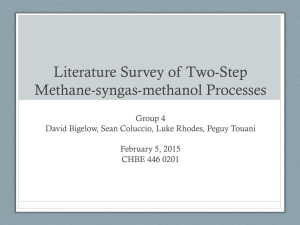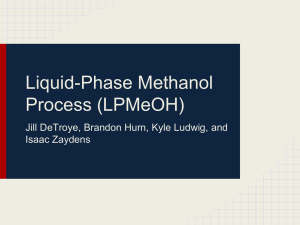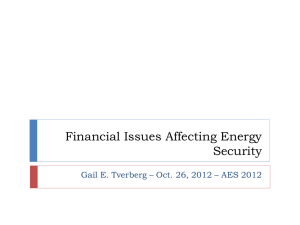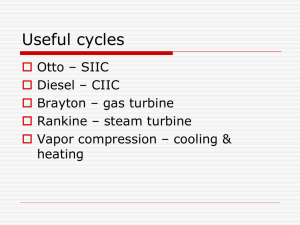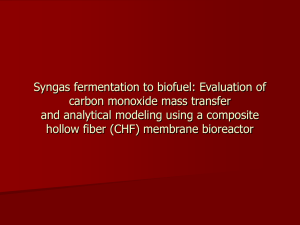Airborne Wind Energy for Storage and Synthetic Fuels
advertisement
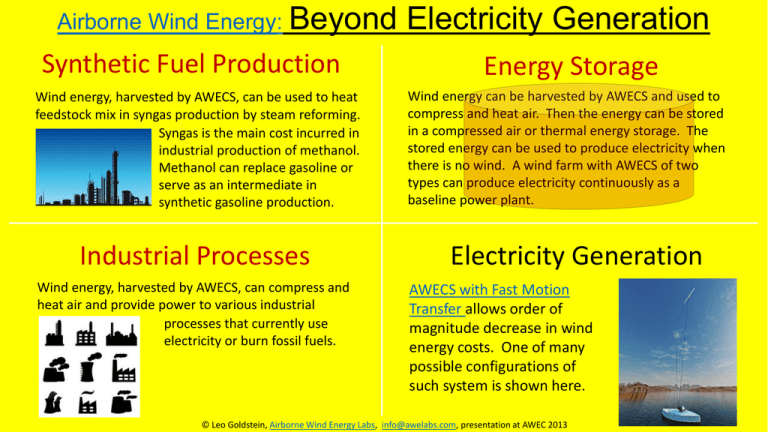
Airborne Wind Energy: Beyond Synthetic Fuel Production Wind energy, harvested by AWECS, can be used to heat feedstock mix in syngas production by steam reforming. Syngas is the main cost incurred in industrial production of methanol. Methanol can replace gasoline or serve as an intermediate in synthetic gasoline production. Industrial Processes Wind energy, harvested by AWECS, can compress and heat air and provide power to various industrial processes that currently use electricity or burn fossil fuels. Electricity Generation Energy Storage Wind energy can be harvested by AWECS and used to compress and heat air. Then the energy can be stored in a compressed air or thermal energy storage. The stored energy can be used to produce electricity when there is no wind. A wind farm with AWECS of two types can produce electricity continuously as a baseline power plant. Electricity Generation AWECS with Fast Motion Transfer allows order of magnitude decrease in wind energy costs. One of many possible configurations of such system is shown here. © Leo Goldstein, Airborne Wind Energy Labs, info@awelabs.com, presentation at AWEC 2013 Syngas Production Synthesis gas (syngas) - a mix of CO and H2 - is a raw material in manufacturing of a large range of industrial materials, including fertilizers, synthetic fuels (methanol, synthetic gasoline and synthetic diesel), polymers etc. Syngas can be produced from the natural gas in a steam reforming reaction CH4 + H2O = CO + 3H2 This reaction is endothermic – it requires adding significant amount of heat. The heat is produced by burning additional amounts of natural gas, usually in a big furnace, surrounding multiple alloy tubes in which the reaction occurs. A picture of a typical steam reformer is shown on the left. The reaction is performed at a high pressure and at temperatures of around 900°. It is possible to supply necessary heat to the mix of the reagents by compressing it repeatedly in a gas compressor. Such system would not require the furnace and the multitude of tubes, replacing them with a compressor and a single big tube subjected to lower temperature. And it would not require burning natural gas for the heat. Unfortunately, if an electrical motor runs the gas compressor, the cost of electricity is prohibitive. This is where airborne energy conversion systems come to help. The motion of a pumping (yo-yo) kite is uniquely suited for compression action, especially driving a piston compressor. Such piston compressor would not evem require a crankshaft, as shown in the next slide. Key Idea: Pumping Kite runs a compressor! Wind wing tether belt drum belt cylinders compressed gas pipe Reel out motion of a belt runs a gas compressor. The compressed gas is heated. Thus wind energy is directly converted into internal energy of the gas. Internal energy of the gas is used in syngas production or by another industrial facility or stored for use in windless time. ELECTRICITY GENERATION The last, but not the least – an order of magnitude decrease in wind energy costs using airborne wind energy system with fast motion transfer. According to [1], 5x decrease in the system costs and 2x increase in the capacity factor are achieved, for total 10x improvement. Component Conventional Wind Turbine AWECS w/FMT Blades / Wings $177 $20 Hub $77 $0 Gearbox $143 $0 Generator $76 $50 Yaw System $19 $10 Nacelle cover & structure $60 $0 Tower $219 $0 Variable Speed System $73 $0 Rotor PBC / wing control surfaces $52 $20 Shaft $41 $0 Other (incl. control system) $63 $90 $1,000 $190 Total Components Cost Publications [1] Goldstein, L.: Theoretical analysis of an airborne wind energy conversion system with a ground generator and fast motion transfer. Article in Energy Journal, 55, 987–995 (2013). [2] Goldstein, L.: Airborne Wind Energy Conversion Systems with Ultra High Speed Mechanical Power Transfer, Chapter 13 in Ahrens, U., Schmehl, R., Diehl, M. (Ed.): Airborne Wind Energy. Springer, Berlin (2013) An Order of Magnitude Decrease in Wind Energy Costs explained Conventional wind turbine has many expensive components AWECS with Fast Motion Transfer needs only a generator and wings (kites)
